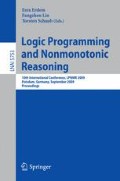Abstract
We consider the problem of whether a given preferred answer set program can be reduced to a propositional formula. Research on this topic is of both theoretical and practical interests: on one hand, it will shed new insights to understand the expressive power of preferred answer set programs; on the other hand, it may also lead to efficient implementations for computing preferred answer sets of logic programs. In this paper, we focus on Brewka and Eiter’s preferred answer set programs. We propose a translation from preferred answer set programs to propositional logic and show that there is one-to-one correspondence between the preferred answer sets of the program to the models of the resulting propositional theory. We then link this result to Brewka and Eiter’s weakly preferred answer set semantics.
Access this chapter
Tax calculation will be finalised at checkout
Purchases are for personal use only
Preview
Unable to display preview. Download preview PDF.
References
Ben-Eliyahu, R., Dechter, R.: Propositional semantics for disjunctive logic programs. Annals of Mathematics and Artificial Intelligence 12, 53–87 (1994)
Brewka, G., Eiter, T.: Preferred answer sets for extended logic programs. Artificial Intelligence 109, 297–356 (1999)
Delgrande, J., Schaub, T., Tompits, H.: A framework for compiling preferences in logic programs. Theory and Practice of Logic Programming 3, 129–187 (2003)
Delgrande, J., Schaub, T., Tompits, H., Wang, K.: A classification and survey of preference handling approaches in nonmonotonic reasoning. Computational Intelligence 20, 308–334 (2004)
Ferraris, P., Lee, J., Lifschitz, V.: A generalization of the Lin-Zhao theorem. Annals of Mathematics and Artificial Intelligence 47, 79–101 (2006)
Grell, S., Konczak, K., Schaub, T.: nomore++: A system for computing preferred answer sets. In: Baral, C., Greco, G., Leone, N., Terracina, G. (eds.) LPNMR 2005. LNCS (LNAI), vol. 3662, pp. 394–398. Springer, Heidelberg (2005)
Lin, F., Zhao, Y.: ASSAT: computing answer sets of a logic program by SAT solvers. Artificial Intelligence 157, 115–137 (2004)
Zhang, Y.: Logic program based updates. ACM Transactions on Computational Logic 7, 421–472 (2006)
Author information
Authors and Affiliations
Editor information
Editors and Affiliations
Rights and permissions
Copyright information
© 2009 Springer-Verlag Berlin Heidelberg
About this paper
Cite this paper
Asuncion, V., Zhang, Y. (2009). Translating Preferred Answer Set Programs to Propositional Logic. In: Erdem, E., Lin, F., Schaub, T. (eds) Logic Programming and Nonmonotonic Reasoning. LPNMR 2009. Lecture Notes in Computer Science(), vol 5753. Springer, Berlin, Heidelberg. https://doi.org/10.1007/978-3-642-04238-6_33
Download citation
DOI: https://doi.org/10.1007/978-3-642-04238-6_33
Publisher Name: Springer, Berlin, Heidelberg
Print ISBN: 978-3-642-04237-9
Online ISBN: 978-3-642-04238-6
eBook Packages: Computer ScienceComputer Science (R0)

